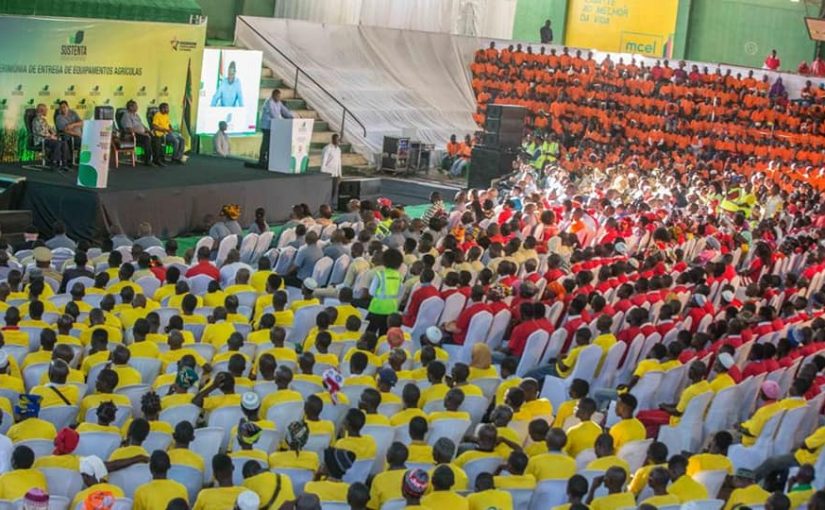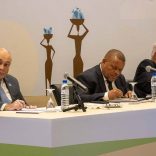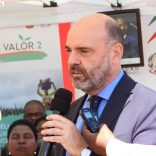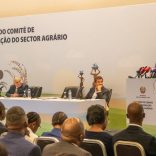Mozambique: Agriculture Minister meets with FAO Director-General QU Dongyu in Rome
Large commercial farmers “will stabilise” Mozambique – Photos

Photo: O País
Mozambican President Filipe Nyusi on Thursday predicted that the “Sustenta” programme, an initiative for the integrated management of agriculture and natural resources, currently under implementation in ten districts in Nampula and Zambezia provinces, will lead to the emergence of Mozambican commercial farmers with an impact on the social and economic stabilisation of the country.
Speaking in Nampula city, Nyusi said that increased investment among the target group, will lead to the expansion of commercial agriculture. “From this programme will come the large scale farmers who will stabilise the country”, he said. “Sometimes the country goes to war for lack of food. If we are all busy working, I don’t see anyone arguing and picking up a gun to do harm”.
Addressing a ceremony at which a consignment of agricultural equipment and inputs was delivered to Sustenta farmers, Nyusi said pacification is achieved, not only through dialogue, but also through concrete actions.

“Hence our project to reintegrate into society the armed men of Renamo will involve large scale projects such as Sustenta, where each citizen works for his own sustenance”, he continued.
He added that the integrated model adopted by Sustenta is leading to an increase in production and productivity, particularly for maize, soya, sesame and pigeon peas. Sustenta took off in February 2017, and Nyusi credited it with a 32 per cent increase in production of the farmers it supports.

Since the launch of the programme, 12,454 kits of agricultural inputs have been distributed, as well as 58 tractors, 136 ploughs, 34 carts and 52 irrigation kits, in addition to the transfer of technology.
“Some people may say this is too little”, said Nyusi. “But this is how we decided to start Sustenta, in two provinces. If it had been for the entire country, it would not have had an impact. Sometimes, when people are scattered, there’s a dispersal of efforts. We decided to start in one place, and do it well, and we are growing”.

Because of its impact so far, the programme will be expanded to all districts in Nampula and Zambezia, and to three other provinces which Nyusi did not specify. The final goal would be for the programme to cover the entire country, but that expansion would be gradual.
Increased production on its own does not guarantee improved living conditions for the rural population. That was why, Nyusi added, “we must also improve access roads to allow production to reach the market”.
So far Sustenta has helped rehabilitate over 250 kilometres of rural roads.

Nyusi also praised the work done by young extensionists in transferring technology to the producers. “The producers must agree to learn so that they don’t waste much time with rudimentary techniques”, said the President. “Those who know how to produce properly are even regarded as sorcerers. So that nobody gets called a sorcerer, it’s good to learn how to work”.
Nyusi urged Mozambicans to be creative, and to diversify production and sources of income. He stressed that the domestic market is not being explored sufficiently, which is why many foodstuffs are still imported, despite the country’s agricultural potential.

“We Mozambicans have lots that we can produce and earn money from”, he said. “But the tendency is for us to look towards the natural gas. We even want to kill each other because of the gas. But the soya we are producing can be transformed into feed for chickens, which will produce eggs and meat to supply these large scale projects. We can’t all do the same thing”.
He recalled the District Development Fund (FDD), which gave loans to people with projects that could provide jobs and boost food production. Many beneficiaries invested the FDD money in flour mills. The result was that “in a village where milling needs were about two tonnes a day, capacity was installed for 50 tonnes a day. So many of the mills shut down”.

The Sustenta beneficiaries told Nyusi that in the near future they hope to organise themselves into cooperatives. They believed this would give them a better chance of repaying the loans they are receiving.

In Nampula, Sustenta covers 50 small commercial farmers, who are working with 4,100 household producers. Their representative, Iahaia Latifo, said cooperatives would increase their income, and overcome the problem of failure to repay the loans.
“We are working to set up partnerships”, he said, “because we understand that individualism does not help progress. We want to organise ourselves into cooperatives. We know that in some countries, producers have even opened banks, but we are a long way from that”.
“Cooperatives would facilitate our development”, Latifo said, “because we would put our ideas together and solve our problems”.
He also stressed the importance of repairing rural roads. “Last year I lost my entire tomato crop, because the access roads to Meti, where I work, were impassable”, he said.













Leave a Reply
Be the First to Comment!
You must be logged in to post a comment.
You must be logged in to post a comment.